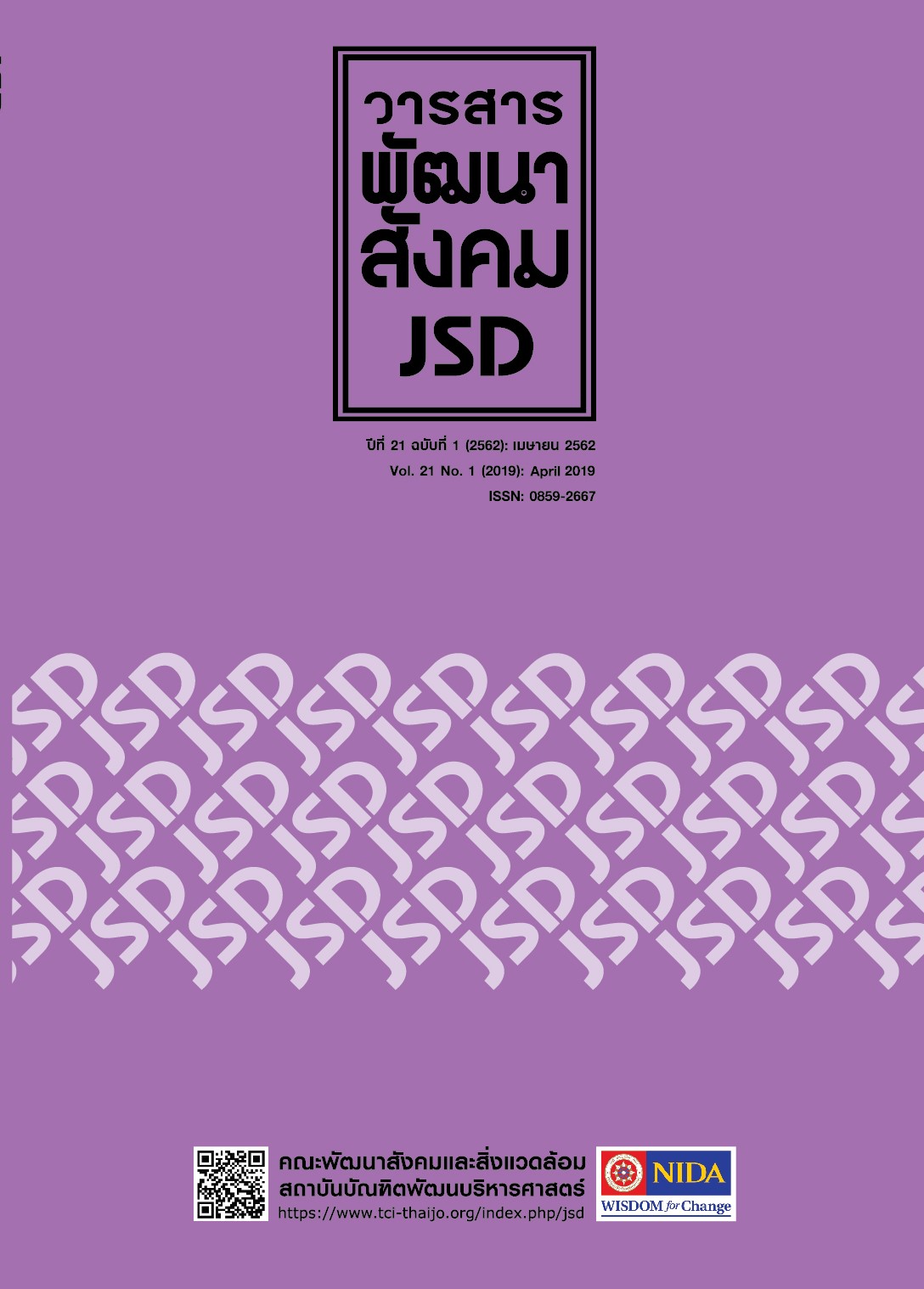When Mothers Return to Work: The Dilemma for Working Mothers in Breastfeeding
Main Article Content
Abstract
This qualitative research aims to explain the working contexts that obstruct to breastfeeding of working mothers. By using purposive sampling technique, 60 working mothers in Bangkok and Chiang Mai province who have been raising their children by breastfeeding for no less than 6 months were chosen. In-depth interviews and non-participation observation were used in data collection process and content analysis was done to analyze the empirical data.
The result reveals that mostly working mothers have been worked under unfavorable working contexts including lacking of pumping breast milk area; unsuitable job types, style of works, and working hours; negative reaction from colleagues; not enough maternity leave; and discrimination within the organization related to job position. Therefore, both society and government have responsibilities to equally provided necessary basic resources without discrimination for every mother in the society, which can be beneficial for them when breastfeeding. Therefore, everyone can access to basic resources and benefits from the policies and its practice thoroughly.
Article Details
References
Chiang Mai Provincial Public Health Office. (2015). Maternal and Child Health Assessment. [in Thai]. Chiang Mai Provincial Public Health Office. Retrieved March 30, 2016 from https://www.chiangmaihealth.go.th/cmpho_web/all_section.php?search_subject=10
Chuang, C., Chang, P., Chen, Y., Hsieh, W., Hurng, B., Lin, S., & Chen, P. (2010). Maternal return to work and breastfeeding: A population-based cohort study. International Journal of Nursing Studies, 47(4), 461–474.
Department of Health. (2008). Ministry of Public Health Act on Code of Breastmilk 2008. [in Thai]. Department of Health, Ministry of Public Health. Retrieved April 30, 2014 from https://www.anamai.moph.go.th/ewt_news.php?nid=822.
Giddens, A. (1991). Modernity and self-identity: self and society in the late modern age. Cambridge, Polity Press.
Hirani, S. A. A., & Karmaliani, R. (2013). Evidence based workplace interventions to promote breastfeeding practices among Pakistani working mothers. Women and Birth, 26(1), 10-16.
Lomrattananont, C. & Sriratanaban, P. (2013). Ideal and Actual Motherhood Identity of Working Women. [in Thai]. Journal of Social Sciences, 18(1), 74-88.
Mandal, B., Roe, B. E., & Fein, S. B. (2010). The differential effects of full-time and part-time work status on breastfeeding. Health Policy, 97(1), 79–86.
Manning, P. (1992). Erving Goffman and Modern Sociology. California, University Press.
National Labour Information Center. (2014). Number of workers Classified by region and sex. National Labour Information Center, Ministry of Labour. [in Thai]. Retrieved March 30, 2016 from https://nlic.mol.go.th/th/node/406
National Statistical Office. (2010). Reproductive health survey 2009. [in Thai]. Bangkok: National Statistical Office.
National Statistical Office. (2012). Situation of children and women in Thailand 2012. [in Thai]. Bangkok: National St
atistical Office.
Pérez-Escamilla, R., & Chapman, D. J. (2012). Breastfeeding protection, promotion, and support in the United States: a time to nudge, a time to measure. Journal of Human Lactation, 28(2), 118–121.
Phromthat, D. (2014). Maternity leave: different welfare in each country. [in Thai]. Business Management Co., Ltd. (BMC). Retrieved August20, 2014 form https://www.bmcsalarysurvey.com/knowledge_detail.php?id=27
Rea, M. F., Venancio, F. I., Batista, L.E., & Greiner, T. (1999). Determinants of the breastfeeding pattern among working women in Sao Paulo. Journal of Human Lactation, 15(3), 233-239.
Ritzer, G. (2007). Contemporary Sociological Theory and Its Classical Roots,The Basics. (2nd ed.). New York, McGraw-Hill.
Ritzer, G. & Goodman, D. J. (2003). Sociological Theory. (6th ed.). New York, McGraw-Hill.
Ryan, A. S., Zhou, W., & Arensberg, M. B. (2006). The effect of employment status on breastfeeding in the United States. Women’s Health Issues, 16(5), 243–251.
Sawatdiwon, S. (2013). Situation of breastfeeding in Thailand. [in Thai]. In International Conference of Breastfeeding Sick Babies, January 22 – 24,2013 The Sukosol Hotel Bangkok. Bangkok: Thai Breastfeeding Center Foundation. Retrieved April 30, 2014 form www.thaibreastfeeding.org/upload/content/file/plan.docx
Siwanit, P. (2007). Rights of working mother and breastfeeding. [in Thai]. Bangkok: Thai Health Promotion Foundation.
Stratton, J., & Henry, B. W. (2011). What employers and health care providers can do to support breastfeeding in the workplace: aiming to match positive attitudes with action. ICAN: Infant, Child, & Adolescent Nutrition, 3(5), 300-307.
Tan, J. (2010). Social relationships in the modern age: never-married women in Bangkok, Jakarta and Manila. Journal of Comparative Family Studies, 41(5), 749-765.
Thailand Press Release. (2013).Breast Feeding Sick Babies.[in Thai]. Retrieved May 6, 2016 form https://www.thaipr.net/health/458151
Turner, P. K., & Norwood, K. (2013). Unbounded motherhood: embodying a good working mother identity. Management Communication Quarterly, 27(3), 396–424.
Wang, W., Lau, Y., Chow, A., & Chan, K. (2014). Breast-feeding intention, initiation and duration among Hong Kong Chinese women: A prospective longitudinal study. Midwifery, 30(6), 678-687.
Yimyam, S. (2002). Socio-economic Cultural and political factors affecting breast feeding practice among working mothers in Chiang Mai. [in Thai]. Chiang Mai: Faculty of Nursing, Chiang Mai University.
Yimyam, S., & Hanpa, W. (2014). Developing a workplace breast feeding support model for employed lactating mothers. Midwifery, 30(6), 720-724.


